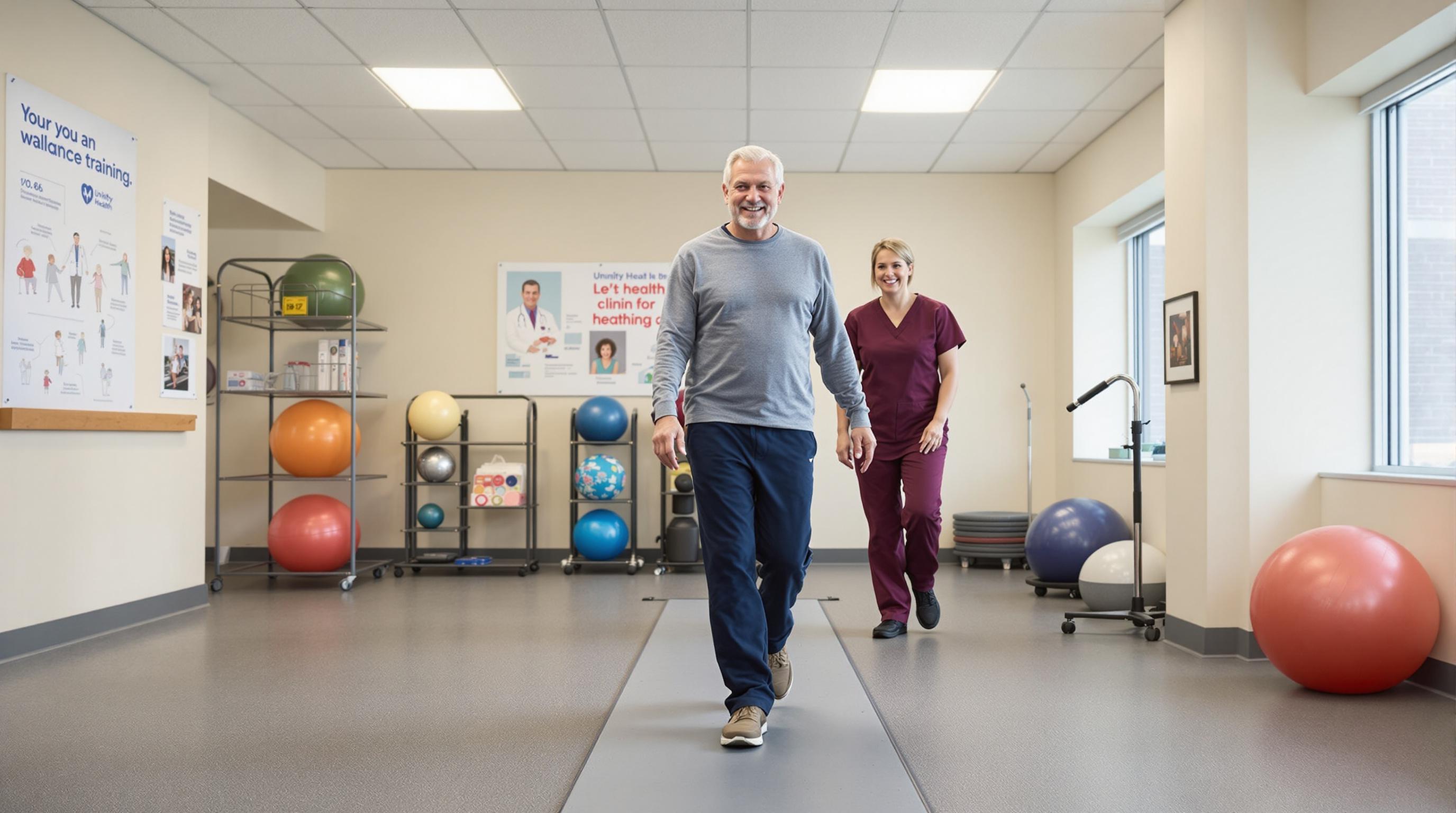Modern approaches to healthy aging clinics
The landscape of healthy aging clinics has undergone a remarkable transformation, evolving from traditional medical care models to comprehensive, integrated healthcare systems specifically designed for seniors. These modern facilities represent a paradigm shift toward proactive, multidisciplinary approaches that address the complex needs of aging populations.
A prime example of this evolution is the new healthy aging clinic in Dieppe, which opened as Vitalité Health Network's first facility of its kind. This 8,000-square-foot clinic embodies the modern approach with its comprehensive multidisciplinary team comprising doctors, nurses, physiotherapists, occupational therapists, speech-language pathologists, and social workers. The clinic's primary objective is to support patients in maintaining independence at home while preserving their quality of life.
Similarly, Unity Health Toronto's Clinic for Healthy Aging at St. Joseph's Health Centre demonstrates the integrated care model that has become the gold standard. Located in the East Wing's 3rd floor, this facility operates Monday through Friday, providing specialized geriatric services through a coordinated team approach that ensures seamless care delivery.
The multidisciplinary team composition has become the cornerstone of modern aging clinics. These facilities typically integrate medical professionals with rehabilitation specialists, creating a holistic care environment where physicians work alongside physiotherapists to address mobility issues, while occupational therapists focus on daily living skills and social workers provide crucial psychosocial support.
What sets these modern clinics apart is their emphasis on preventive care integration. Rather than simply treating existing conditions, these facilities proactively identify risk factors and implement intervention strategies. The Hamilton Health Sciences Centre for Healthy Aging exemplifies this approach, serving patients 65 and older while extending services to younger individuals experiencing age-related conditions like Parkinson's or dementia.
These contemporary models prioritize reducing hospitalizations and improving patient flow by accelerating certain discharges, ultimately transforming how healthcare systems approach senior care through coordinated, preventive-focused interventions.

Assessment and preventive care programs
Comprehensive assessment procedures form the cornerstone of effective healthy aging clinics, providing detailed evaluations that identify potential health risks before they develop into serious conditions. Leading facilities employ multidisciplinary teams to conduct thorough screenings that encompass physical, cognitive, and psychosocial assessments tailored specifically for older adults.
The SAFE (Senior Adult Fitness Exercise) Program developed by the McGill University Health Centre exemplifies innovative preventive care approaches. This comprehensive exercise initiative addresses a critical statistic: one in four people above 75 years of age falls every year, with 10 percent of these falls resulting in serious injuries including fractures and head trauma. The program's adapted low-impact exercises have demonstrated remarkable success, reducing falls by approximately 40 percent through consistent implementation.
Modern assessment protocols typically include fall risk evaluations, mobility assessments, medication reviews, and cognitive screenings. The Centre for Healthy Aging at Hamilton Health Sciences emphasizes patient eligibility criteria that focus on individuals aged 65 and older, or younger patients experiencing age-related difficulties such as Parkinson's disease or dementia. Their comprehensive approach includes specialized services for osteoporosis screening and geriatric psychiatry consultations.
Early intervention strategies implemented through these assessment programs significantly impact senior health outcomes. The preventive focus aims to maintain independence at home while reducing hospitalizations and improving overall quality of life. Programs like SAFE integrate seamlessly with home care services, ensuring that prevention becomes an accessible community-wide initiative rather than a hospital-based intervention.
These preventive care programs represent a paradigm shift from reactive to proactive healthcare, demonstrating that structured assessment and intervention can substantially improve aging outcomes while reducing healthcare system burden.

Specialized treatments and therapeutic interventions
Modern healthy aging clinics offer a comprehensive array of specialized treatments designed to address the multifaceted challenges of aging. These evidence-based interventions go beyond basic medical care to provide targeted solutions for physical, cognitive, and functional decline.
The Centre for Healthy Aging at Hamilton Health Sciences exemplifies this comprehensive approach through their integrated treatment model. Their facility provides specialized geriatric medicine and geriatric psychiatry services, recognizing that successful aging requires addressing both physical and mental health components simultaneously. This dual-focus approach ensures patients receive holistic care that addresses the interconnected nature of age-related health challenges.
Physical therapy and rehabilitation services form the cornerstone of therapeutic interventions at leading facilities. These programs extend far beyond traditional physiotherapy to include specialized mobility training, balance enhancement protocols, and strength-building exercises specifically designed for older adults. The therapeutic approach emphasizes functional improvement rather than mere symptom management, helping patients regain and maintain essential daily living skills.
Cognitive enhancement programs represent another critical intervention area. These evidence-based therapies utilize neuroplasticity principles to maintain and improve cognitive function. Programs may include memory training exercises, attention-building activities, and problem-solving challenges that help preserve mental acuity. The integration of technology-assisted cognitive training provides personalized interventions tailored to individual cognitive profiles.
Unity Health Toronto's Clinic for Healthy Aging demonstrates the importance of multi-disciplinary therapeutic teams. Their approach combines medical specialists, physiotherapists, occupational therapists, and social workers to create individualized treatment plans. This collaborative model ensures that interventions address not only immediate health concerns but also long-term functional goals and quality of life objectives.
Innovative therapeutic modalities continue to emerge within these specialized settings. Osteoporosis treatment programs offered at Hamilton Health Sciences showcase how targeted interventions can prevent fractures and maintain bone health. These programs combine pharmacological interventions with specialized exercise protocols and nutritional counseling to create comprehensive bone health strategies.
The integration of outreach services ensures that therapeutic interventions reach homebound patients who cannot access traditional clinic settings. This approach recognizes that effective treatment delivery must adapt to patients' functional limitations while maintaining therapeutic effectiveness and safety standards.
Maintaining independence and quality of life
Building on the specialized treatments available at modern aging clinics, the focus naturally shifts to how these interventions translate into maintaining independence and quality of life for seniors. Clinics like Unity Health Toronto's Clinic for Healthy Aging demonstrate a comprehensive approach that extends beyond medical treatment to encompass lifestyle preservation and community integration.
The multidisciplinary team approach employed by these facilities includes occupational therapists, social workers, and physiotherapists who work together to assess each patient's unique needs for independent living. This holistic evaluation considers not just medical conditions, but also home environment, daily living skills, and social support systems that are crucial for maintaining autonomy.
Key components of independence-focused care include home care support coordination, where clinics connect patients with appropriate community resources and home visiting services. The Centre for Healthy Aging in Hamilton exemplifies this by providing home visits to housebound patients within their service area, ensuring that geographic barriers don't prevent access to specialized care.
Lifestyle modifications form another cornerstone of independence maintenance. Clinics help patients implement adaptive strategies such as fall prevention programs, medication management systems, and environmental modifications that allow seniors to remain safely in their homes. The emphasis on community integration ensures that patients maintain social connections and access to support networks, which are vital for both physical and mental well-being as they age.
Memory and cognitive health services
Specialized memory care services represent a crucial component of comprehensive aging care, addressing the growing need for early detection and management of cognitive decline. The Healthy Aging & Memory Clinic exemplifies this approach through its multidisciplinary team comprising nurse practitioners, social workers, pharmacists, and representatives from the Alzheimer's Society.
These specialized clinics conduct thorough cognitive assessments that evaluate individuals' overall health as it relates to their cognitive functioning. The comprehensive evaluation process includes detailed neuropsychological testing, medical history review, and collaborative discussions with caregivers who provide essential insights into daily functioning changes.
Treatment planning encompasses both medical interventions and supportive care strategies. Clinics connect patients and their families to community resources while developing personalized care plans aimed at maintaining cognitive function and quality of life. The interdisciplinary approach ensures that patients receive holistic care addressing medication management, lifestyle modifications, and psychosocial support.
Caregiver support forms an integral part of these services, recognizing that family members require education, resources, and emotional support to effectively assist their loved ones through the challenges of cognitive decline.
Future of longevity medicine and wellness programs
The landscape of longevity medicine is rapidly evolving, with innovative research from institutions like Mayo Clinic's Kogod Center on Aging leading breakthrough discoveries. Scientists are finding that aging may be a modifiable risk factor - a process that can be controlled through targeted interventions and personalized approaches.
Mayo Clinic's research focuses on increasing human "health span" - the number of years individuals spend living independently and remaining free of age-related diseases. Their comprehensive approach suggests that genes play a smaller role in overall health than previously thought, with lifestyle decisions and personal attitudes beginning in young adulthood having greater impact.
Emerging technological advances are revolutionizing aging care through precision medicine, advanced diagnostics, and personalized treatment protocols. These developments complement traditional wellness programs by offering data-driven insights into individual aging patterns and optimal intervention strategies.
The future of longevity medicine emphasizes proactive health management rather than reactive treatment, with multidisciplinary teams working together to address the complex interplay between physical, cognitive, and social factors in healthy aging.
